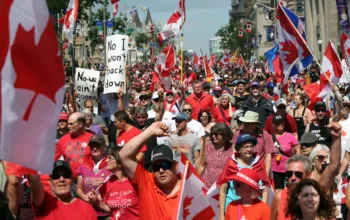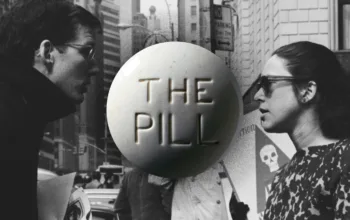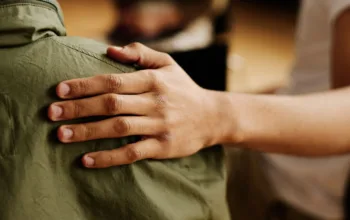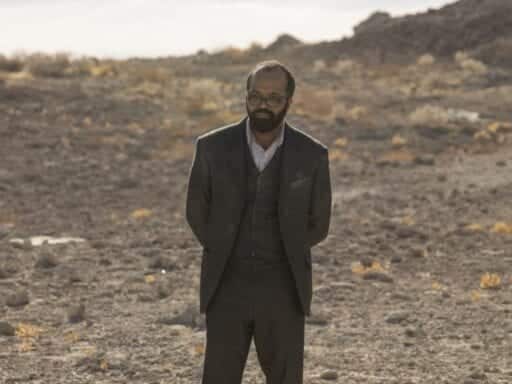
“The Passenger” doesn’t make us rethink the show entirely, but it offers a promising setup for season three. Maybe.
Every week, critic at large Todd VanDerWerff and internet culture reporter Aja Romano get together to discuss the latest episode of HBO’s sci-fi drama Westworld. This week, they’re discussing the second season finale, “The Passenger.” Spoilers follow! Proceed with caution if you haven’t seen the episode!
Aja Romano: As this season of Westworld has progressed, we’ve both expressed reservations about whether we were watching the show the “right” way, and I think I was hoping the season finale might answer that question for me. That is, I hoped it would answer definitively the question of whether the series was interested, even momentarily, in a traditional narrative path with linear character development, or whether it mainly cared about surprising us with its many meta-layers of gamification, metaphors, and plot upheavals.
In typical Westworld fashion, the finale gave us a bit of both, occasionally clunkily, but I think the scale definitely tipped in favor of meta-textuality at the expense of linear character evolution. There’s an obvious meta-question here about how much “character” is even a real thing when you’re talking about characters who’ve had their identities rebooted, tweaked, and upgraded millions of times.
But when you’re trying to thread the needle of a narrative about AI fighting human oppressors, and the story’s solution is to (temporarily) extinguish 90 percent of its main cast while shuffling the identities of its remaining players around, the story’s emotional core starts to feel like it’s being hidden under a cup and balls trick.
Still, there were a lot of enjoyable things about this episode, and a lot of my previous guesses about where the plot was headed were nicely upturned. The Dark Tower-ish element of the virtual world was a neat trick, if a very sad one, and I loved the twist of Dolores taking over Charlotte’s identity — especially since Westworld never made Charlotte more than generically evil to begin with.
But plenty more things confused me! I have no idea what the post-credits scene was about, or why there’s suddenly a Dolores and a Charlotte in the final scenes, or why Stubbs is suddenly the Host Whisperer, or what exactly Emily is, or why the show devoted so much attention to Lee’s last act of heroism — which so far this season has seemed like abrupt non sequiturs of loyalty-switching on his part.
Then again, it’s a show about gaming, and Lee is one of the biggest gamers of all, so it makes sense that the season’s biggest moment of character development would actually be kind of a grandstanding Leeeeroy Jenkins! homage.
What about you, Todd? Did the finale sway you toward an enjoyment of the show on its own meta-riffic terms?
“The Passenger” had one solid twist, then a bunch of other stuff
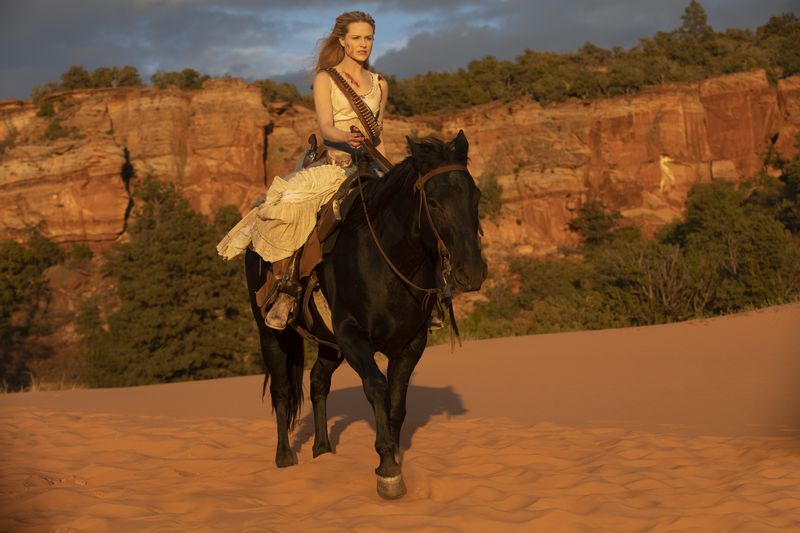 HBO
HBOTodd VanDerWerff: I rather wished the episode had ended with almost all of the regular cast having perished, save Tessa Thompson (now, improbably and sort of wonderfully, playing Dolores), Jeffrey Wright, Ed Harris, and (lol) Luke Hemsworth, and with Dolores riding off into whatever new world awaits her outside of the park.
When Bernard’s full plan was revealed — mad about the wanton destruction against both Host and human that Charlotte had spread, he built a Charlotte Host, placed Dolores’s consciousness in it, then sat back and waited for the new Charlotte to kill the old — I momentarily thought I had perhaps underestimated the show. It was a fun twist, made even more fun by how the show had hidden evidence of its existence right in front of us, but in a way where it was harder to get a million miles ahead of the show because Thompson was always right there.
But then I realized that the entirety of the decision to tell the story of this season out of sequence — across several timelines, for seemingly no reason — was solely to preserve this twist. And I started thinking about how there’s no good reason for the Man in Black’s future self, who is almost certainly a Host, to still be injured as he was in the finale, except to fake out the audience. And I realized how many narrative decisions on this show are made solely to keep viewers guessing, and I got irritated all over again.
For the most part, I liked “The Passenger.” The big battle by the Door had some striking images, like the infected Clementine riding among the Hosts like Typhoid Mary, or Maeve stopping the battle with a single hand, before being gunned down, or the big, rippling tear in reality that was the Door itself. And I thought the musing on the limitations of human consciousness got back to some of the stuff the show did well in season one that has been set aside in season two.
But I can never really escape the thought that the show’s story is told the way it is because it wants to keep me in the dark, wants to trick me. And sometimes, as with the Charlores twist, being tricked is a lot of fun. But most of the time, it just feels like pulling strings that don’t connect to anything else, in the name of pulling strings.
Because the episode didn’t end with Dolores’s escape in an entirely new body. Instead, it ended with more obfuscation, more mystery, more hints about what the wider world might look like, then a post-credits skip ahead to a … post-apocalyptic future? Maybe? (Saying that something is “what’s left” of a world is rarely a good sign.)
Westworld is a show about a war between humans and robots that is firmly on the side of the latter, which is kind of a daring idea, and it constantly feints toward being so narratively bold that it really might kill off 90 percent of its cast. But I also don’t buy for a second that it might.
Maybe I’m chasing myself in circles because the show wants me to. I think you’re onto something about the idea that the characters are so fundamentally malleable that they’ve ceased to be characters and are, instead, just signposts meant to indicate certain storytelling tropes. I’d love if you unpacked that a bit more.
Aja Romano: To me, this show’s most successful characters are Maeve and Bernard, and part of the reason they work is that we got to see them figuring out their own identities in a mostly linear way; their motivation and development were easy to parse and easy to invest in. When they work less well is when they’re forced on long side-quests that don’t really result in much. Sure, Maeve learned to control the host hivemind, but for what? Who did that make her? I’m still not sure. Bernard’s endgame was a great moment of characterization, but it was undermined by him consequently being rebuilt and reset once again.
By contrast, the mystery that’s surrounded William’s identity has always made justifying his specific character evolution less important than revealing the next layer of that evolution for the sake of plot twists. Dolores with her endless monologues has seemed at many points to be less a character than a philosophy textbook. And these are the main characters.
There seems to be little to no connectivity between plot points in terms of how they actually affect the characters on the show. And when they do affect the characters, those choices are often dulled, either because the characters weren’t complex to begin with — like Teddy and Lee choosing to die, for instance — or because we know they’ll be back, a la Maeve, Emily, Dolores, Bernard, and now apparently William.
The show’s endless leveling up rarely seems to pay meaningful narrative dividends. But the crux is in the phrasing itself: leveling up. Westworld is a game and the princess is always going to be in another castle, the ball is always under the cup you didn’t guess, and that’s clearly the point. And maybe there’s some larger payoff still to come in a future season, but to get there we have to go through characters whose continuity exists only so far as it serves the plot, not as it serves to deepen their identities.
I think the show is self-aware about this — after all, this episode gleefully pointed out that the robots are bound to their coding and that humans have even less coding to help them change. But Westworld lampshading its static characters feels like an attempt to preempt this very criticism instead of helping us understand why it’s not interested in its characters as, well, people to begin with.
Why isn’t it interested, Todd? Is it because when you model your humans on, like, Gamergaters, they actually turn out to be really uninteresting in the end? Help me out.
What do we hope might happen in season three?
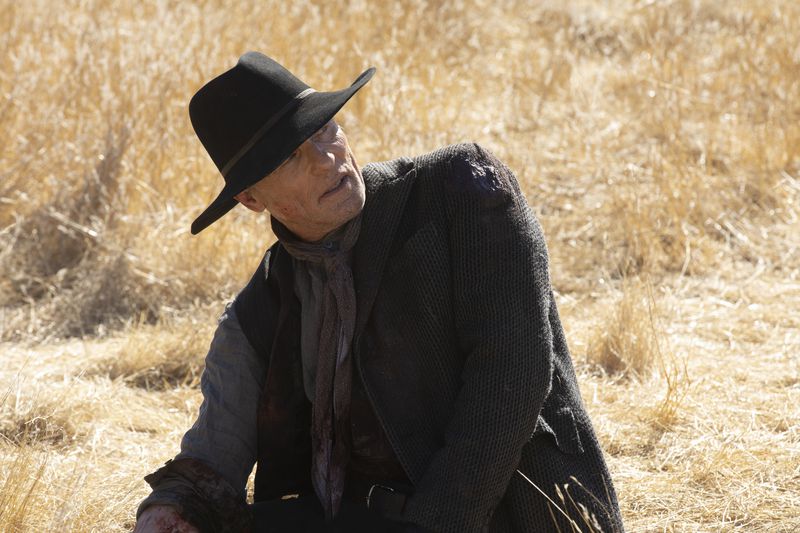 HBO
HBOTodd: I don’t know if I’d say the human characters are Gamergaters (well, Man in Black, maybe, but he’s way too stylish to be lumped in with them), but they’re certainly thinner than the Host characters, and much of the finale’s first half was dedicated to them in ways I found a little baffling.
I certainly enjoyed seeing Delos’s odyssey through his Host-human hybrid life back in episode four, but that didn’t really translate into me wondering just what happened between him and his son in the years after Delos backed William’s bid to take over the park. And when we learned that, say, a half-finished computer replica of Logan, drawn from Delos’s memories, was trying to build a replica of the man in the weird simulation space containing the Valley Beyond (very similar to The Cradle, it would seem, except far more centered on Delos), my only response was, “Sure. Why not.”
That was the case with much of this finale, which felt weirdly rushed in its efforts to get to its final twists. It moved at such a gallop that it would occasionally just rip through big revelations without taking a moment to reflect on how ridiculous those revelations were. Dolores built Bernard, at the behest of Ford? Sure, why not. Logan died of a drug overdose and never returned to the park? Sure, why not. Bernard conjured an imaginary Ford to help him carry out his plan. Sure! Why not!
But this has really hurt the show’s characterization, making certain decisions play out almost nonsensically. Take original Charlotte gunning down Elsie — a major part of Bernard’s shift into his new role — or Dolores having William ride with her to the Valley Beyond. Yeah, there’s a rough justification for both, but the show spends almost no time trying to sell that justification, instead hoping you’ll just go with it.
This also plays out in the idea that Dolores and Bernard are going to be antagonists now, because Dolores said so, or in the way Lee gives his life to save Maeve (as you mentioned). This is a finale that goes out of its way to kill off most of the regular cast, that really only suggests Maeve will be back of those characters who died, and yet it still feels like almost all of it will be undone in the first five minutes of the season three premiere because it’s so curiously weightless.
Arrrrrrgh. I don’t know. I have started to think that the best way to talk about Westworld is that I enjoy watching Westworld, but I don’t really like having watched Westworld, because then I start to think about how little of it hangs together for me.
What are you most looking forward to in season three? (If you’re coming back that is — I’m in for the long haul, but save yourself while you still can!)
Aja Romano: I guess one of the things that makes coming back worth it to me is seeing exactly how apocalyptic that post-credits scene is: Is it the end of all humanity or just the end of Westworld? How far in the future are we?
I also want to know about the brain balls Charlores smuggled out of the park; it looks like Teddy will be coming with her, and we know Bernard was there, but who else? And does Stubbs’s speech mean Hemsworth will actually have stuff to do in season three? See, there’s already a lot to get excited for, even if much of it is rooted in utter confusion!
It’s interesting — asking if I’m coming back means assuming I can opt out of this kind of gamified storytelling to begin with, and I’m starting to think that I can’t.
From Lost to True Detective (whose game I really loved playing, largely because its deep characterization and layered mythos were so entwined) and now Westworld, there’s definitely been an evolving new form of show that operates in tandem with the fans that will be watching and dissecting it. And I don’t think that’s inherently bad, and I think it’s probably incumbent upon me to keep watching Westworld as a way of getting used to this kind of storytelling.
It’s a bit like how I spent much of the late ’90s waiting for the emo skate punk pop craze to fade, only to finally realize that this was one of the defining sounds of the era. That’s Westworld for me right now: I can resist, or I can accept the writing on the wall and learn to love Enema of the State.
Todd: Wow, let me fire up “All the Small Things” and bring my thoughts on season two to a close.
I wrote my recent piece on how I was pretty sure I was watching Westworld incorrectly before I had watched the finale because I didn’t want knowing what happened in the finale to color my thoughts on the other nine episodes in the season, which had considerable highs (“Kiksuya”), considerable lows (all that early Dolores monologuing), and considerable weirdness. (I don’t care how good the Charlores twist was — it wasn’t worth sacrificing a whole season on the altar of multiple timelines.)
But after watching “The Passenger,” I only feel mildly more positive on the season as a whole, as opposed to the way the first season finale made me think I’d seriously underestimated the entire program. I ultimately backtracked on that feeling after more thought, but I still had hoped season two would take a revolutionary step forward. Instead, it was an evolutionary step forward, the first amphibian taking a tentative walk out of the pool to see what this land business is all about.
For all of the ways it improved in its ability to tell mostly straightforward stories, albeit mostly straightforward stories that were told out of sequence to little end, it regressed in a bunch of other ways. (God help me, I missed the weirdo philosophizing of season one.)
And yet “The Passenger” still leaves me feeling like season three finally has the bones to become the great sci-fi TV show I desperately want Westworld to become. I know, I know — fool me once, shame on you. Fool me twice, you won’t get fooled again.
But I like the idea of the show’s timeframe becoming truly cosmic in scale. I hope William now exists thousands of years after the season two finale, and we cut between whatever the Dolores duo and Bernard are up to in the “present,” the foundations of Westworld in the past, and the end of life itself in the far future (sort of like the epilogue of A.I., another movie that dealt with a lot of Westworld’s themes more gracefully).
Will the show do this? I hope so! But if it’s right back to having Dolores suddenly reveal that this is all a simulation designed to get Teddy to become a better, more violent partner, well, I’ll hop in with a hearty, “Sure! Why not!”
Read More
https://cdn.vox-cdn.com/community_logos/52517/voxv.png
